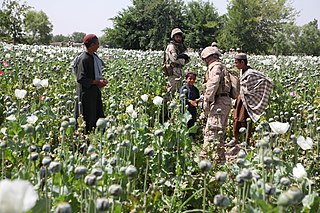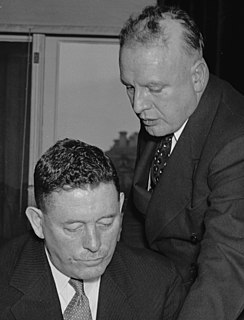
The Kellogg–Briand Pact or Pact of Paris – officially the General Treaty for Renunciation of War as an Instrument of National Policy – is a 1928 international agreement on peace in which signatory states promised not to use war to resolve "disputes or conflicts of whatever nature or of whatever origin they may be, which may arise among them". The pact was signed by Germany, France, and the United States on 27 August 1928, and by most other states soon after. Sponsored by France and the U.S., the Pact is named after its authors, United States Secretary of State Frank B. Kellogg and French foreign minister Aristide Briand. The pact was concluded outside the League of Nations and remains in effect.

The law of war is the component of international law that regulates the conditions for initiating war and the conduct of warring parties. Laws of war define sovereignty and nationhood, states and territories, occupation, and other critical terms of law.

The Hague Conventions of 1899 and 1907 are a series of international treaties and declarations negotiated at two international peace conferences at The Hague in the Netherlands. Along with the Geneva Conventions, the Hague Conventions were among the first formal statements of the laws of war and war crimes in the body of secular international law. A third conference was planned for 1914 and later rescheduled for 1915, but it did not take place because of the start of World War I.
The International law bearing on issues of Arab–Israeli conflict, which became a major arena of regional and international tension since the birth of Israel in 1948, resulting in several disputes between a number of Arab countries and Israel.

The Single Convention on Narcotic Drugs, 1961 is an international treaty that controls activities of specific narcotic drugs and establishes a system of regulations for their medical and scientific uses.
The International Narcotics Control Board (INCB) is an independent treaty body, one of the four treaty-mandated bodies under international drug control law.

The International Law Commission (ILC) is a body of experts responsible for helping develop and codify international law. It is composed of 34 individuals recognized for their expertise and qualifications in international law, who are elected by the United Nations General Assembly (UNGA) every five years.
The expression International Opium Convention refers either to the first International Opium Convention signed at The Hague in 1912, or to the second International Opium Convention signed at Geneva in 1925.

The Commission on Narcotic Drugs (CND) is one of the functional commissions of the United Nations' Economic and Social Council (ECOSOC), and is the central drug policy-making body within the United Nations System. The CND also has important mandates under the three international drug control conventions, alongside the three other treaty-mandated bodies: United Nations Office on Drugs and Crime, World Health Organization, and International Narcotics Control Board.
The Convention for Limiting the Manufacture and Regulating the Distribution of Narcotic Drugs was a drug control treaty promulgated in Geneva on 13 July 1931 that entered into force on 9 July 1933.

The Protocol Amending the Agreements, Conventions and Protocols on Narcotic Drugs concluded at The Hague on 23 January 1912, at Geneva on 11 February 1925 and 19 February 1925, and 13 July 1931, at Bangkok on 27 November 1931 and at Geneva on 26 June 1936 was a treaty, signed on 11 December 1946 at Lake Success, that shifted the drug control functions previously assigned to the League of Nations to the United Nations. As the Protocol's official title says, it modifies the provisions of the:
A drug policy is the policy regarding the control and regulation of psychoactive substances, particularly those that are addictive or cause physical and mental dependence. While drug policies are generally implemented by governments, entities at all levels may have specific policies related to drugs.
A peace congress, in international relations, has at times been defined in a way that would distinguish it from a peace conference, as an ambitious forum to carry out dispute resolution in international affairs, and prevent wars. This idea was widely promoted during the nineteenth century, anticipating the international bodies that would be set up in the twentieth century with comparable aims.

The Convention on Psychotropic Substances of 1971 is a United Nations treaty designed to control psychoactive drugs such as amphetamine-type stimulants, barbiturates, benzodiazepines, and psychedelics signed in Vienna, Austria on 21 February 1971. The Single Convention on Narcotic Drugs of 1961 did not ban the many newly discovered psychotropics, since its scope was limited to drugs with cannabis, coca, and opium-like effects.

The League of Nations was established with three main constitutional organs: the Assembly; the Council; the Permanent Secretariat. The two essential wings of the League were the Permanent Court of International Justice and the International Labour Organization.
Jonathan Lucas was appointed by UN Secretary-General Ban Ki-moon on 22 March 2010 as the Secretary of the International Narcotics Control Board and Chief of the International Narcotics Control Board Secretariat. In this position, Dr. Lucas is in charge of the permanent staff in at the United Nations in Vienna working on the international drug control treaties. The Board has had predecessors since the time of under the League of Nations, starting in 1909 in Shanghai with the International Opium Commission, the first international drug control conference. The International Opium Convention of 1925 established the Permanent Central Board. That Board started its work in 1929. After the dissolution of the League, the 1946 Protocol Amending the Agreements, Conventions and Protocols on Narcotic Drugs concluded at The Hague on 23 January 1912, at Geneva on 11 February 1925 and 19 February 1925, and 13 July 1931, at Bangkok on 27 November 1931 and at Geneva on 26 June 1936, created a Supervisory Body to administer the estimate system. The functions of both bodies were merged into the Board by the 1961 Single Convention on Narcotic Drugs. The composition of the Board under the Single Convention was strongly influenced by the 1946 treaty.
The law of extradition in the Republic of Ireland includes legislation and case law.